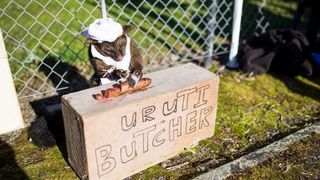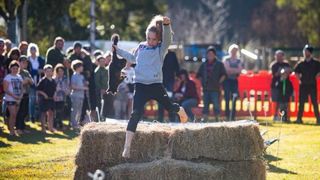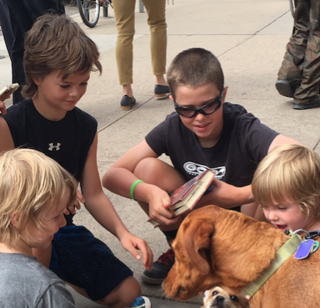Some New Zealand schools encourage kids to kill animals and it’s simply wrong.
This essay by Marc Bekoff, Ph.D., originally appeared in Psychology Today
During the past few weeks I’ve written a number of essays about New Zealand youngsters being encouraged to harm and to kill nonhuman animals (animals) as part of their education. It’s all part of the country’s war on wildlife, the goal being to get rid of all predators by 2050. (For more details please see “Imprinting Kids for Violence Toward Animals,” “Scapegoating Possums: Science, Psychology, and Words of War,” “Long-Term Effects of Violence Toward Animals by Youngsters,” “Youngsters Encouraged to Kill Possum Joeys in New Zealand,” and links therein.) I also did a recent interview with New Zealand’s Safe and Sound radio about how wrong it is to teach kids to harm and to kill other animals (also on Facebook). I’m incredulous that something like this actually occurs.
“It’s a good day out and we have lots of fun.”
Two things motivated me to write this brief essay. The first was an email I received from a woman who wrote, “I have seen your recent essays on what is happening in schools throughout my country and I am appalled. Thank you for spreading the word. Can you please help my daughter tell her teachers that she does not want to participate in these types of events and contests?” She also mentioned that other parents agreed with her and were at wit’s end because people in power were telling the kids it was perfectly okay to harm and to kill the animals and to parade around with corpses of the animals they slaughtered.

Source: With permission of Lynley Tulloch
The second motivator was an essay by Christina Persico called “Possums and pig hunting fundraiser for country school” that contains some incredibly disturbing images of kids abusing animals. I’ve had a good number of emails about this essay, in which we learn, “Hundreds attended the family fun day that included all the usual events—the possum carrying obstacle course, the heaviest magpie or rabbit competition, best dressed possum, heaviest goat head and, of course, the gumboot throw” and “The pig hunting opened on Thursday, giving hunters the opportunity to find the heaviest boar. They had more than 100 entries, with hunters registering from as far as Awakino and Whangamomona.”
We’re also told, “There were also a number of entries for the dead possum dress-up including a butcher, a cowboy and a Donald Trump, complete with the shock of blond hair.” One student summarized what happened as, “It’s a good day out and we have lots of fun.”
Just say no to violence toward animals: Glorifying killing and teaching disrespect are wrong and there is no way to justify this sort of brutality
I thought long and hard after I received the email from the woman in New Zealand and I wrote back that her daughter should simply refuse to partake and be nice about it. She should just say “no,” not make a ruckus, and serve as a model for others who might also not want to kill the so-called pests.
Over the years I’ve learned that when one student speaks out against unacceptable cruelty, there are others who agree, but for one reason or another didn’t say anything until they knew they had some support. This is understandable, and because this woman’s daughter seems willing to say something, she can support others who are waiting in the wings and hesitant to speak out. It feels downright abusive for people in positions of authority to have youngsters sanction violence toward animals as part of school programs.

Possum carrying obstacle course; With permission of Lynley Tulloch
I also thought of what I call the 10 P’s of rewilding, now morphed into 12 P’s. They include being proactive, positive, persistent, patient, peaceful, practical, powerful, passionate, playful and present, to which I’ve added being principled and proud. The woman’s daughter could fall back on many of these P’s and should be proud of her position against causing intentional harm to the animals. What a wonderful role model.
I’m incredulous when I hear and see what is happening in New Zealand and how killing contests are chalked up as fun while becoming family affairs. And, as I’ve written before, I find it very disconcerting when one considers a phenomenon called “the link,” which highlights the relationship between violence toward animals and violence toward humans (for more discussion please se “Long-Term Effects of Violence Toward Animals by Youngsters” and links therein).

Source: Marc Bekoff
All in all, I hope that everyone in New Zealand who opposes killing contests that include youngsters and adults will speak out against such unnecessary violence. There is no reason to glorify killing and disrespect for other beings.
I want to end with an upbeat message, and this last image is one of kids interacting with dogs near my home. I asked some of them about how they felt about other animals and the messages were all very positive. I imagine, and can only hope, that the teachers and school administrators who encourage kids to harm and to kill other animals, and that youngsters who say they enjoy it, are in the vast minority.
Speaking out against violence toward other animals is one way to call attention to what is happening and to locate others who agree with this point of view. As Gretchen Wyler once said, “Cruelty can’t stand the spotlight.” As like-minded people discover one another, things can change and other animals and other humans will benefit from the kindness, compassion, and respect that is shared. Therein lies hope for the future.
Marc Bekoff’s latest books are Jasper’s Story: Saving Moon Bears (with Jill Robinson); Ignoring Nature No More: The Case for Compassionate Conservation; Why Dogs Hump and Bees Get Depressed: The Fascinating Science of Animal Intelligence, Emotions, Friendship, and Conservation; Rewilding Our Hearts: Building Pathways of Compassion and Coexistence; The Jane Effect: Celebrating Jane Goodall (edited with Dale Peterson); and The Animals’ Agenda: Freedom, Compassion, and Coexistence in the Human Age (with Jessica Pierce). Canine Confidential: Why Dogs Do What They Do will be published in early 2018. Learn more at marcbekoff.com.






